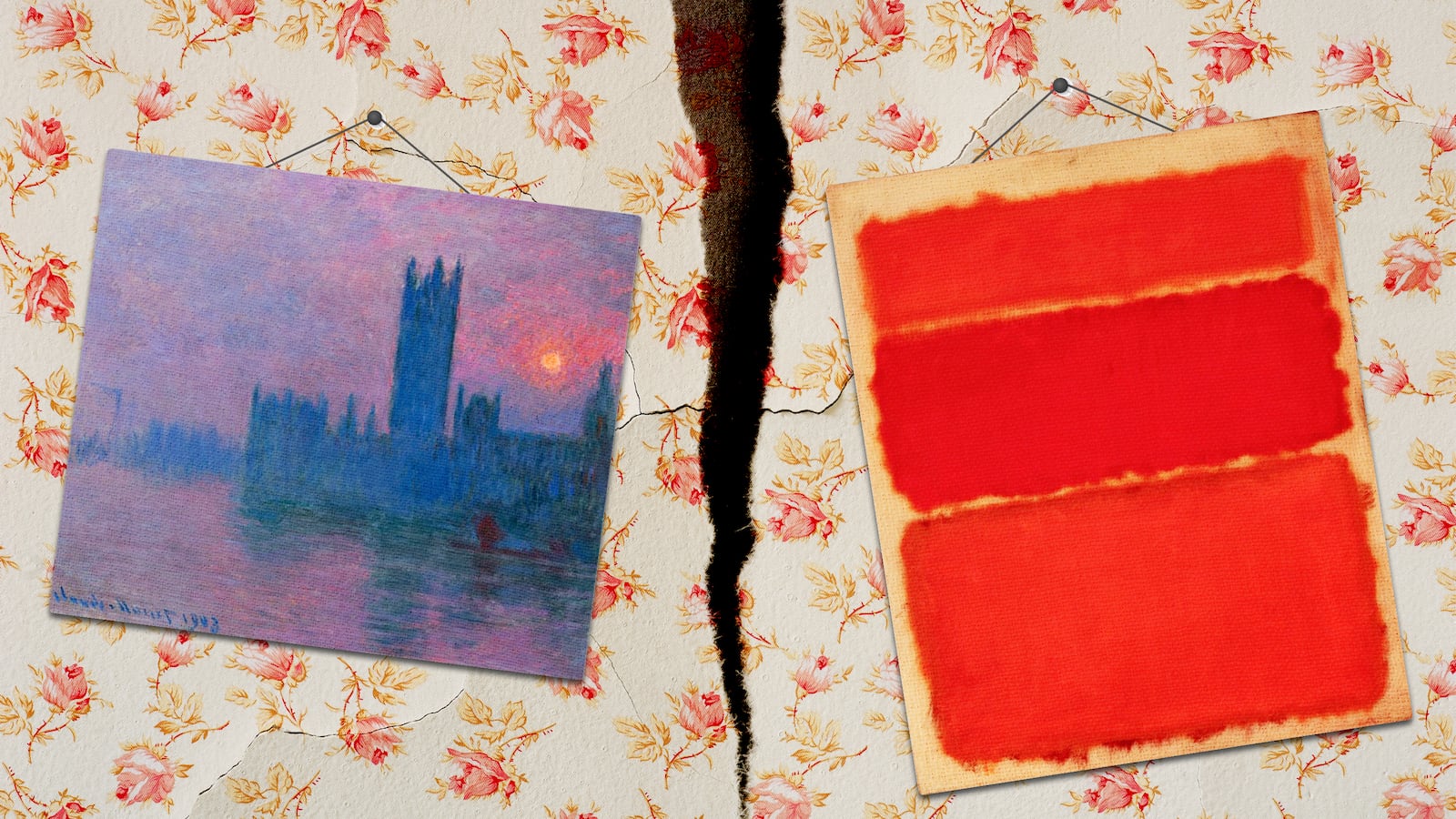The rich are different from you and me. Their divorces are uglier, and sometimes involve Monets. Marital spats, tabloid tales, and savvy women who just won’t surrender that community-property masterpiece play a prominent role in this year’s big art auctions.
On Thursday, the $250 million estate sale of Anne Bass goes on the auction block at Christie’s. The philanthropist socialite had a gorgeous trove that includes two creamy orange-red Rothkos (each circling “low” estimates of $45 million and $60 million) and three Monets (estimated at $30 million to $60 million).
Results should be high: Christie’s is already rocking from several hundred million in art sales just so far this week. Along with Miss Bass, who acquired much of her collection during her 22-year marriage to Texas oil magnate Sid Bass, there’s a roughly $250 million forced sale next week at Sotheby’s of the art of real estate developer Harry B. Macklowe and ex-wife Linda Burg. In 2019, Macklowe famously taunted his wife of five decades with 42-foot-high photos of himself and his new wife installed on a building where Linda had had a contract to buy an apartment. So is she seeking her Gerhard Richter, or revenge?
Then there’s Libbie Mugrabi, who split from David Mugrabi, scion of the family that holds the globe’s largest collection of Andy Warhols. The divorce was technically finalized last year but legal, verbal and recent auction battles at Phillips over art linger. Plus, after the split, formerly friendly art dealers “treated me terribly,” she told The Daily Beast.

Libbie Mugrabi and David Mugrabi in 2018.
Patrick McMullan/Patrick McMullan via GettyWhat is going on? In the spectacular art boom of the last 40 years, even people with Hamptons homes, private jets, and mega-yachts have found that their most valuable asset is the art collection the couple built during their marriage.
In Ms. Bass’ case, she was awarded a sum of money in her 1988 divorce plus, as is common in Texas and elsewhere, the house and its contents. But 1987 was the year the great art boom began with the $39.8-million sale of Vincent van Gogh’s “Sunflowers.” Now, those contents are now likely to be worth more than the total settlement. Her 1920 Edgar Degas sculpture of a ballerina alone, “Petite danseuse de quatorze ans,” will start the bidding at about $20 million. As for the battling Macklowes, an initial art auction last year raised $676 million dollars.
The road to auction was long for both these couples. The Macklowes were married in 1959 and dove into a lifetime of buying exceptional, even revolutionary, works by artists like Warhol, Cy Twombly, and Robert Gober. According to a Sotheby’s specialist, what made the collection all the more dear was that they virtually never sold. “The works just disappeared into their homes.”
After 50 years of marriage, he adds, it was assumed that those works would probably never come back on the public market again. But in 2016, they filed for divorce. Warring appraisals of what the collection was worth (especially to Linda, who had put a lot of the work in) and constant spats prevented a swift resolution.

Linda and Harry Macklowe in 2009.
JP PULLOS/Patrick McMullan via GettyThe judge finally ordered that the matter simply go to a court-appointed receiver, Acquavella Gallery director Michael Findlay, the nearest thing the art world has to a celebrity Solomon. Findlay is a well-regarded art-market scholar who had run Christie’s Impressionist department in the decade after the “Sunflowers” took off. Ultimately, he opted to head to auction with the proceeds divvied up.
Meanwhile, the Basses were married a few years later, in 1965. They were college sweethearts, she Vassar, he Yale. They split in 1988, in what was described at the time the largest divorce settlement in Texas history. He swiftly remarried, to Mercedes Kellogg.
Anne Bass became a major patron of ballet worldwide, and died in 2020 at the age of 78. Christie’s won her highly coveted collection with a bid that guaranteed minimum prices on some works—regardless of what happened at auction. Christie’s also toured the collection to cities around the world in a luxurious display that mimics Bass’s own home.
The famous historic art collections of the robber barons, the oil magnates and Silicon Valley pioneers have always been associated with the men, or husbands, no matter what role the spouse played. Christie’s, though, is positioning Bass as a force all her own, lauding “her remarkably informed eye and female perspective in a world dominated by male collectors.”
These days, the ladies are taking a bigger public role and fighting for their share—as they should, says Victor Weiner, art appraiser for Lloyd’s of London in their dispute with Steve Wynn on a damaged Picasso, among other high-profile cases. “In my experience, if the woman is involved in the art at all, she is not a back-seat driver.”
“Why are you surprised? In everything women do, they do more,” Libbie Mugrabi told The Daily Beast. But the courts know little about art and some appraisals can be “fishy,” she added. “I’d be surprised if there was one judge in New York that has ever been inside a museum or gallery.” And, by the time a divorce arises, “you’re really, really attached to the art.”
Mrs. Mugrabi did receive some artworks in her split, she notes, but she says some arrived damaged. And in a lawsuit filed in New York in February, as Vanity Fair has reported, a dealer put up a Haring sculpture at Phillips auction house nearly identical to one formerly owned by Mrs. Mugrabi. David Mugrabi’s company later reported it stolen. (Mrs. Mugrabi says the matter is resolved; The Daily Beast approached Mr. Mugrabi for comment via his company.)
On the auction house side, nobody is hiding the juicy details: in fact, it may add to the pitch. At Sotheby’s on Monday of this week, a group of “high net-worth individuals and museum donors” were given both a tour of the Macklowe collection—and all the dish. Notes one invited guest who favored the couple’s de Kooning, “It was Champagne and sandwiches in the ‘preferred’ lounge upstairs. We were told it was a contentious divorce and the sale was court-ordered.”
Anne Bass lived a tabloid life, too, between the divorce, an incident of being held hostage by masked men in her Litchfield, Connecticut, home, and the subsequent successful trial of her butler for the crime. But amidst at all, she bought magnificent art.
Things will only get messier, predicts appraiser Weiner, as art prices soar, because fractional ownership of artworks (he was involved in the valuation of a share in a Damien Hirst) is becoming increasingly more common. And so will women paying for the art purchases. When a couple arrived shopping for art for their summer home recently, one art dealer says he was given a credit card by the man for his picks, but “she bought on Venmo when they left the gallery.”
As for the battling Macklowes, an initial art auction last year raised $676 million dollars.
Meanwhile, Libbie Mugrabi is still buying pieces. She doesn’t miss her husband’s taste in art, she told The Daily Beast, pointing out that “you know, many men are color-blind.”
Update: The final total for the Macklowe Collection at Sotheby’s was a spectacular $922 million, the record for any collection and every piece sold. Indeed, in some cases it was the Macklowes themselves buying their treasures back—Henry Macklowe was spotted by the Wall Street Journal bidding from a private skybox high above the sale. As for the Anne Bass collection, it sold well above expectations for $363 million.






